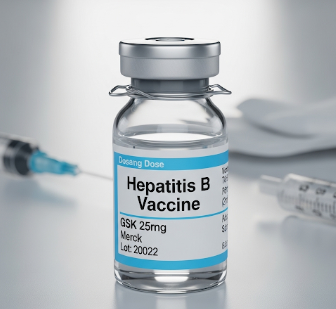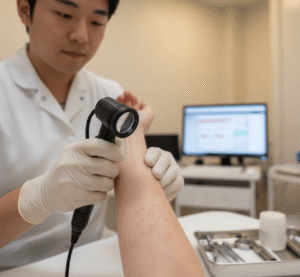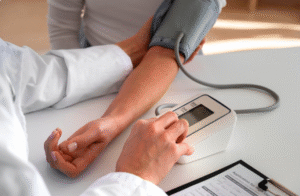What is the Hepatitis B Vaccine?
The Hepatitis B vaccine is an immunization that protects against Hepatitis B virus (HBV) infection, a serious liver infection that can lead to chronic liver disease, cirrhosis, or liver cancer. The vaccine stimulates the body’s immune system to produce protective antibodies, providing long-term immunity.
💡 Key Points About Hepatitis B Vaccine:
✔️ Protects against a highly contagious liver infection
✔️ Part of routine childhood vaccination in Korea
✔️ Also recommended for adults at high risk – Healthcare workers, travelers, or people with chronic conditions
✔️ Composed of recombinant viral antigens – Safe, non-infectious, and widely used worldwide
Types of Hepatitis B Vaccine:
➡️ Single-antigen vaccine – Standard protection against HBV
➡️ Combination vaccines – Includes Hepatitis A, DTP, or other routine vaccines
➡️ Adult formulations – Higher antigen doses for adults or immunocompromised individuals
In Korea, the Hepatitis B vaccine is widely available at hospitals, clinics, and public health centers, ensuring both children and adults can access protection.
Why It’s Done
Vaccination is performed to prevent HBV infection and its severe complications:
✔️ Prevent liver inflammation and failure – Hepatitis B can lead to chronic liver disease
✔️ Reduce risk of cirrhosis or liver cancer – Major long-term consequences of chronic infection
✔️ Protect newborns from vertical transmission – From HBV-positive mothers
✔️ Decrease community transmission – Widespread immunization reduces overall infection rates
Clinical Benefits:
➡️ Highly effective – Over 95% immunity after full vaccination series
➡️ Long-lasting protection – Usually lifelong immunity, especially with childhood immunization
➡️ Safe for most individuals – Minimal serious side effects
➡️ Part of national immunization programs – Ensures population-wide coverage
In Korea, Hepatitis B vaccination is a key public health strategy, included in the National Immunization Program (NIP) for infants, adolescents, and at-risk adults.
Alternatives / Other Prevention Strategies
While vaccination is the most effective prevention, other strategies include:
⭐ Screening and treatment of infected individuals – Reduces risk of transmission
⭐ Safe blood and organ donation practices – Prevents accidental infection
⭐ Safe sex practices – Using condoms to reduce sexual transmission
⭐ Avoiding sharing needles or personal items – Prevents parenteral transmission
👉 Key Point: Vaccination remains the primary and most reliable method of preventing Hepatitis B, while other measures complement it.
Preparation
Proper preparation ensures effective vaccination and safety:
🔹 Medical history review – Allergies, previous reactions, or chronic illnesses
🔹 Screening for HBV status – Especially for adults at high risk
🔹 Inform provider about pregnancy – Hepatitis B vaccine is safe in pregnancy, but professional advice is recommended
🔹 Schedule adherence – Complete the full vaccine series for optimal protection
⭐ Hydration and general wellness – Being well-rested and hydrated can help reduce mild post-vaccination reactions
⭐ Consultation – Discuss any concerns with a healthcare provider before vaccination
How It’s Done
The Hepatitis B vaccine is administered via intramuscular injection:
- Injection site – Typically the deltoid muscle in adults or anterolateral thigh in infants
- Dosage schedule –
🔹 Infants: 3 doses (0, 1, and 6 months)
🔹 Adults: 2–3 doses depending on formulation and schedule - Combination vaccines – May include other childhood vaccines in a single shot
- Post-injection observation – Typically 15–30 minutes to monitor for rare allergic reactions
Highlights:
✔️ Quick and straightforward procedure
✔️ Minimal discomfort at injection site
✔️ High success rate in producing immunity
Recovery / Follow-up
Recovery is generally immediate, with minimal side effects:
✔️ Mild soreness or redness at injection site – Usually resolves in 1–2 days
✔️ Mild fever or fatigue – Rarely occurs, short-lived
✔️ Follow-up doses – Ensure completion of full vaccination series for long-term protection
✔️ Serology testing – Optional antibody testing for high-risk adults or immunocompromised individuals
⭐ Long-term follow-up:
- Immunity is typically long-lasting, especially for those vaccinated as infants
- Booster doses are rarely needed unless immune response is inadequate
Complications / Risks
The Hepatitis B vaccine is very safe, but some considerations include:
⚠️ Mild side effects – Soreness, redness, or low-grade fever
⚠️ Allergic reactions – Extremely rare, treated promptly in healthcare settings
⚠️ Temporary fatigue or malaise – Usually resolves quickly
⚠️ In immunocompromised individuals – May have a reduced immune response
➡️ Korea follows strict vaccination protocols and monitoring, minimizing risks and ensuring patient safety.
Treatment / Vaccine Services in Korea
Korea provides comprehensive access to Hepatitis B vaccination:
🏥 Public health centers – Free or subsidized vaccination for infants and at-risk adults
🏥 Private clinics and hospitals – For adult travelers, occupational vaccination, or catch-up programs
🏥 Combination vaccines – Include Hepatitis B with other routine childhood immunizations
🏥 School-based programs – Ensures adolescents are fully vaccinated
🏥 Travel medicine clinics – For visitors or expatriates needing Hepatitis B protection
Why Korea is a Preferred Destination:
✔️ National Immunization Program (NIP) coverage – Ensures high vaccination rates
✔️ Experienced healthcare providers – Administer vaccines safely
✔️ Standardized schedules and monitoring – Compliance with international guidelines
✔️ Integration with public health campaigns – Education and awareness on HBV prevention
Approximate Costs in Korea:
🔹 Infant vaccination (per dose) → Usually covered by NIP
🔹 Adult vaccination (private clinics) → $30 – $60 per dose
🔹 Combination vaccines → $50 – $80 per dose
🔹 Serology testing → $20 – $50 if checking antibody levels
Conclusion
The Hepatitis B vaccine is a safe, effective, and essential preventive measure against a serious liver infection.
It helps individuals:
✔️ Avoid acute and chronic liver disease
✔️ Prevent cirrhosis and liver cancer
✔️ Reduce risk of transmission to family and community
✔️ Achieve long-term immunity with minimal side effects
In Korea, patients benefit from:
✔️ Accessible vaccination services for all age groups
✔️ Skilled healthcare professionals administering safe vaccines
✔️ Integration into national immunization programs
✔️ Education and awareness campaigns for HBV prevention
👉 Key Message: Receiving the Hepatitis B vaccine in Korea provides effective, long-lasting protection against HBV, ensuring individual and public health safety.













